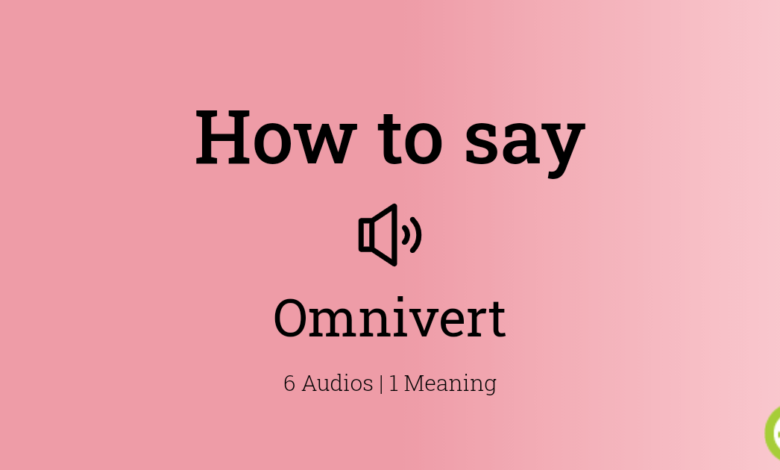What is an Omnivert? Understanding the Unique Personality Type

An omnivert is a person who has traits of both introversion and extroversion. If you have ever felt like you enjoy being alone sometimes but also love socializing in other situations, you might be an omnivert! Being an omnivert means you can switch between being outgoing and needing quiet time, depending on your mood and the situation.
This personality type is different from being a strict introvert or extrovert. Omniverts have the ability to adapt their behavior. They can shine in social events but also find peace in solitude. In this blog post, we will explore what makes omniverts special, how to identify if you are one, and how to embrace this unique personality.
What Does It Mean to Be an Omnivert
An omnivert is someone who has both introverted and extroverted traits. This means they can be quiet and reserved in some situations, but in others, they may be very outgoing and social. It’s not just about being shy or being energetic; it’s a mix of both! People who are omniverts enjoy different things depending on their mood or the situation they are in.
For example, you might love hanging out with friends, but after a busy day, you feel like staying home and relaxing. That’s the omnivert’s way of balancing energy. They know when to seek quiet time and when to enjoy being around others. It’s a flexible way of living, allowing them to adapt to any situation.
Being an omnivert is not the same as being strictly an introvert or extrovert. While introverts tend to avoid social situations and extroverts thrive in them, omniverts can shift between the two. This allows them to feel comfortable both alone and in groups, depending on how they feel at the moment.
Signs You Might Be an Omnivert
If you think you might be an omnivert, there are certain signs to look for. You might find that you can easily switch between being social and needing quiet time. For example, you might enjoy a fun day out with friends, but then need a few hours alone to recharge. This is a clear sign of an omnivert’s ability to adapt.
Here are a few other signs that could mean you are an omnivert:
- You enjoy socializing but need time alone to feel your best.
- You can be the life of the party but also love staying in with a book or movie.
- Your mood affects how much you want to talk to people.
- You like both being around people and having time for yourself.
These traits show that you’re not just one or the other; you have the ability to be both depending on the situation.
How Omniverts Balance Socializing and Solitude
One of the best things about being an omnivert is the balance they find between socializing and solitude. Omniverts know when to step back and enjoy time alone, but they also enjoy connecting with others. It’s all about finding the right balance for their energy levels and emotional needs.
Social events can be fun for omniverts, but they also know that too much time with others can leave them feeling drained. After spending time in big groups, they might need some quiet time to recharge. This could mean taking a nap, reading a book, or just sitting in silence. On the other hand, when they’re feeling energized, they can easily switch back to being social.
Tips for Balancing Social and Alone Time
- Listen to your body: If you’re feeling tired or overwhelmed, it might be time to take a break.
- Set boundaries: Don’t feel pressured to attend every event. Choose what works best for you.
- Take small breaks: Even in a social setting, take a moment to step away and recharge.
- Know your limits: Understand how much time you can spend with others before needing rest.
This balance is key for omniverts, allowing them to live a full life without feeling exhausted.
The Pros and Cons of Being an Omnivert
 t comes with its own set of advantages and challenges. On the plus side, omniverts can enjoy the best of both worlds. They get to experience the excitement of socializing and the peace of alone time. This ability to switch between the two gives them flexibility and emotional balance.
t comes with its own set of advantages and challenges. On the plus side, omniverts can enjoy the best of both worlds. They get to experience the excitement of socializing and the peace of alone time. This ability to switch between the two gives them flexibility and emotional balance.
However, being an omnivert can also be difficult. At times, they might feel torn between wanting to be alone and wanting to be with others. It can sometimes be hard to explain their need for both socializing and solitude, which may lead to misunderstandings with others. Some omniverts might also struggle with feeling out of place in large groups or being alone for too long.
Pros of Being an Omnivert
- You can thrive in social settings and enjoy peaceful alone time.
- You are adaptable to different situations.
- You are comfortable with both introverted and extroverted activities.
Cons of Being an Omnivert
- It can be hard to balance both social and alone time.
- Others may not always understand your need for both.
- Sometimes, you may feel drained from switching between the two.
Understanding the pros and cons can help omniverts embrace their personality while managing their energy effectively.
Omnivert vs Introvert: What’s the Difference
An omnivert is often confused with an introvert, but there are some key differences. While introverts prefer solitude and often feel drained by too much social interaction, omniverts can enjoy social settings but need to balance it with alone time. In other words, omniverts are more flexible than introverts.
Introverts typically prefer spending time alone or in small, quiet settings. They might avoid big social events or find them tiring. Omniverts, on the other hand, can enjoy these same social events, but they might need a break afterward. Their ability to switch between being social and needing quiet time is what sets them apart.
Omnivert vs Extrovert: How Do They Compare
While an omnivert shares some characteristics with extroverts, such as enjoying socializing, the difference lies in how much energy they gain from social situations. Extroverts feel energized by being around people and often thrive in busy, crowded places. Omniverts, however, enjoy socializing but also need time to recharge afterward.
Extroverts may find it difficult to understand the need for alone time, as they are constantly energized by others. Omniverts, however, know when to take a step back and enjoy some peace. This balance allows them to stay connected to others without feeling drained.
How to Embrace Your Omnivert Personality

If you think you’re an omnivert, the key is to embrace it! Understanding that it’s okay to need both social time and alone time is important. Omniverts should feel proud of their ability to adapt and enjoy different aspects of life.
Here are some ways to embrace being an omnivert:
- Accept your need for balance: Understand that it’s normal to crave both socializing and solitude.
- Set healthy boundaries: Don’t feel bad about taking breaks from social events.
- Be kind to yourself: It’s okay to have different needs depending on how you feel.
By accepting your omnivert personality, you can live a life that feels balanced and true to who you are.
Conclusion
Being an omnivert is a special way of experiencing life. You can enjoy spending time with friends, but you also know when to take a break and be by yourself. This balance between socializing and alone time makes life more interesting and fun. It helps you feel energized in different situations and live in a way that feels right for you.
If you think you might be an omnivert, that’s okay! There’s no right or wrong way to be. The important thing is understanding yourself and finding a balance that works. Embrace your unique personality and enjoy both the quiet moments and the fun times with others.
Q: What is an omnivert
A: An omnivert is someone who has both introverted and extroverted traits. They can enjoy socializing but also need time alone to recharge.
Q: How do I know if I’m an omnivert
A: If you enjoy both socializing and alone time depending on your mood, you might be an omnivert. You can easily switch between the two based on the situation.
Q: Can omniverts enjoy big social events
A: Yes, omniverts can enjoy social events, but they may need time alone afterward to recharge, unlike extroverts who feel energized by being around others.
Q: Are omniverts the same as introverts or extroverts
A: No, omniverts are different from both. They have the ability to be outgoing or enjoy solitude, depending on their mood, unlike introverts or extroverts who lean more toward one side.
Q: How can an omnivert balance social time and alone time
A: Omniverts can balance their time by listening to their body and setting boundaries. If they need a break, they can take it, and if they feel energized, they can join social events.
Read more:



